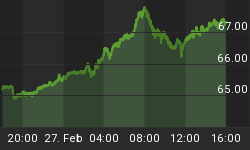Deutsche bank shares recovered from a plunge to all-time record lows on Friday on a "save the day" news leak that the US department of Justice would reduce its mortgage-manipulation fine from $14 billion to $5.4 billion.
Shares that were down about 9% rallied to close up 6.4%. Deutsche bank had set aside $5.5 billion to cover losses. The $14 billion fine was nearly as large as companies market cap of about $18 billion.
Today, six current or former Deutsche Bank managers along with seven other individuals were charged with fraud related to Monte dei Paschi derivatives. Banca Monte dei Paschi, in Italy, is the world's oldest bank, dating to the year 1624.
Please consider Ex-Deutsche Bank Executives Among 13 Charged in Paschi Probe.
Six current and former managers of Deutsche Bank AG — including ex-asset and wealth management head Michele Faissola — along with former executives at Nomura Holdings Inc. and Banca Monte dei Paschi di Siena SpA were charged in Milan for colluding to falsify the accounts of Italy's third-biggest bank and manipulate the market.
A judge in Milan approved a request by prosecutors to try 13 bankers on charges over separate derivative transactions Paschi arranged with the securities firms, said a lawyer involved in the case, who attended the closed-door hearing Saturday, where the decision was announced.
Monte Paschi, the world's oldest bank, restated its accounts and has been forced to tap investors twice to replenish capital amid a surge in bad loans and losses on derivatives. It's now attempting to convince investors to buy billions of soured debt before a fresh stock sale.
Deutsche Bank's shares have slumped 49 percent in Frankfurt this year, swinging wildly last week on news that hedge-fund clients withdrew some funds. Monte Paschi has dropped 84 percent this year amid concern it will struggle to restore profitability and strengthen its finances.
The charges culminate a three-year investigation by prosecutors that showed Monte Paschi used the transactions to hide losses, leading to a misrepresentation of its accounts between 2008 and 2012. The deals came to light in January 2013, when Bloomberg News reported that Monte Paschi used derivatives struck with Deutsche Bank to mask losses from an earlier derivative contract dubbed Santorini.
Former Deutsche Bank managers Michele Foresti, who oversaw rates and European credit flow trading, and Ivor Dunbar, former co-head of global capital markets, also were also indicted.
Monte Paschi's former executives Giuseppe Mussari, Antonio Vigni and Gianluca Baldassarri and Nomura's former bankers Sadeq Sayeed and Raffaele Ricci also will face trial for allegedly obstructing regulators after the investigation revealed that the 2009 deal, dubbed Alexandria, was designed to disguise losses from a previous investment.
Deutsche Bank's Dario Schiraldi, Matteo Vaghi and Marco Veroni as well as Monte Paschi's Daniele Pirondini and Marco Di Santo will go to trial, which is scheduled to begin on Dec. 15.
One of my speculations regarding Deutsche Bank's share price involved a derivatives mess or counter-party risk with Monte dei Paschi.
That speculation was spot on. What else are Deutsche Bank and Monte dei Paschi hiding? I don't know but a $42 trillion notional derivatives book value provides ample room.
Many have pointed out the key word is "notional", and that many of the contracts are internal, netting out to zero. OK, call it $1 trillion if you like, or even $500 billion.
A 1% loss on $1 trillion looks like this: $10,000,000,000.
What is the real value at risk? I don't know, and its derivatives mess seems so complicated I believe it may not know either. And what happens if Monte dei Paschi goes under or vice versa?
Again, I don't know. We are all speculating about the problems, and the amounts.
This stuff has been going on a long time. On February 15, 2013, ZeroHedge commented on the Deutsche Bank, Monte Paschi Cover-Up: Tier 1 Capital and an Equity Swap.
Suspicious Accounting Methodology Change
On September 20, I asked Is Deutsche Bank Cooking its Derivatives Book to Hide Huge Losses?.
In that post I pointed out a suspicious accounting methodology change related to derivatives.
Accounting Methodology Change
I dove into Deutsche Bank's 4Q/FY2015 Presentation which contained these statements on various pages.
- Continued strong de-leveraging in the quarter of EUR 44 billion on an FX neutral basis, principally in derivatives.
- Full year 2015 de-leveraging of EUR ~130 billion on an FX neutral basis.
- Equity Derivatives significantly lower y-o-y driven by lower client activity exacerbated by challenging risk management in certain areas.
- Lower loan loss provisions reflecting portfolio quality and the benign economic environment.
- Despite adverse FX impact, non-interest expenses decreased mainly due to lower litigation and performance-related expenses.
- De-risking activity was the main driver of Balance Sheet reductions in 4Q2015.
Consolidation & Adjustments
Income before income taxes (IBIT) does not look pretty, to say the least. And what's with these accounting methodology changes?
Lower loan loss provisions? In this environment?
Red Flags
Accounting methodology changes and lower loan loss provisions are a pair of red flags.
So we still do not know everything, but we do know there are fraud charges involving both Deutsche Bank and Monte dei Paschi.
Anyone surprised?
Related Articles
- Italy's Zombie Banks on Death Bed, Bail-Ins Coming?.
- Atlas Rescue Phase II: Italy Eyes Another Private Deal to Bail Out Banks.
- Merkel Says No Aid for Deutsche Bank; Depositor Bail-In Coming Up?
- Deutsche Bank Shares Plunge to Record Low: Who Got the Trade Correct?
















